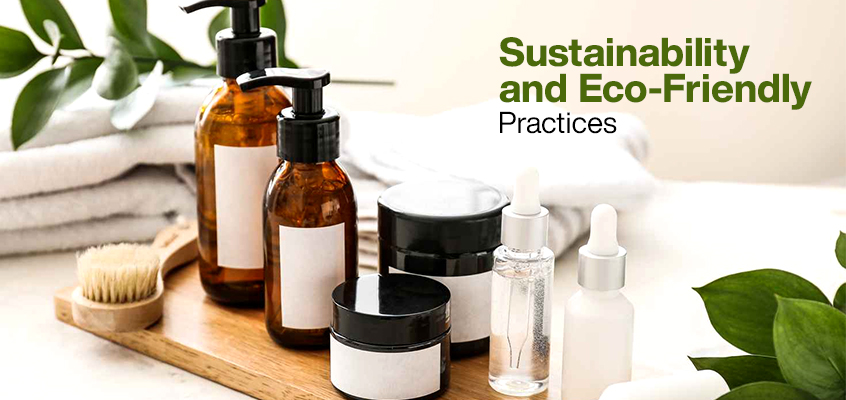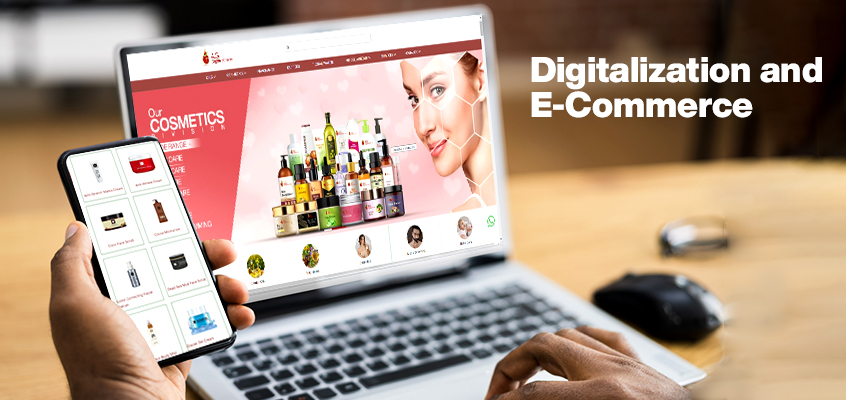Latest Skincare Industry Trends

Unveiling the Latest Skincare Industry Trends for New Brands: A Comprehensive Guide
Dive into the latest skincare industry trends and learn how new brands can capitalize on them to gain a competitive edge in the market.
- Introduction
- Overview of the skincare industry
- Importance of staying abreast of industry trends
- Objectives of the blog post
- Clean Beauty Movement
- Definition and principles of clean beauty
- Increasing consumer demand for clean and natural skincare products
- Strategies for new brands to incorporate clean beauty into their product lines
- Personalized Skincare Solutions
- Emergence of personalized skincare tailored to individual needs
- Benefits of personalized skincare for consumers
- Technologies driving the trend and how new brands can leverage them
- Sustainability and Eco-Friendly Practices
- Growing emphasis on sustainability within the skincare industry
- Consumer awareness of environmental impact and demand for eco-friendly products
- Ways new brands can integrate sustainable practices into their operations
- Digitalization and E-Commerce
- Shift towards online skincare shopping
- Importance of establishing a strong digital presence for new brands
- Effective digital marketing strategies for reaching target audiences
- Ingredient Transparency and Education
- Increasing demand for transparency in skincare product formulations
- Importance of educating consumers about skincare ingredients
- Approaches for new brands to prioritize ingredient transparency
- Wellness and Self-Care
- Intersection of skincare and wellness trends
- Rise of self-care rituals and their influence on skincare choices
- Opportunities for new brands to align with wellness trends
- Global Expansion and Diverse Markets
- Opportunities for skincare brands to expand globally
- Understanding diverse consumer preferences and cultural considerations
- Strategies for new brands to successfully enter international markets
- Conclusion
I. Introduction
The skincare industry is a dynamic and rapidly evolving sector that caters to the diverse needs and preferences of consumers worldwide. With an array of products ranging from cleansers and moisturizers to serums and masks, the industry is continuously innovating to meet the ever-changing demands of its customers. In this blog post, we will delve into the latest trends shaping the skincare landscape and discuss how new brands can leverage these trends to establish a strong presence in the market.
- Overview of the skincare industry The skincare industry is a multi-billion-dollar global market encompassing a wide range of products and services aimed at improving and maintaining the health and appearance of the skin. From cleansers and moisturizers to serums and treatments, skincare products cater to various skin types, concerns, and preferences. The industry is characterized by constant innovation, with new ingredients, technologies, and trends driving consumer demand and shaping market dynamics. With a growing emphasis on clean beauty, sustainability, and personalized solutions, the skincare industry continues to evolve to meet the ever-changing needs and preferences of consumers worldwide.
- Importance of staying abreast of industry trends Staying abreast of industry trends is crucial for businesses to remain competitive and relevant in the ever-evolving marketplace. By keeping up with the latest developments, companies can anticipate shifts in consumer preferences, identify emerging opportunities, and adapt their strategies accordingly. This proactive approach enables businesses to stay ahead of the curve, maintain a competitive edge, and capitalize on new trends before their competitors do. Ultimately, staying informed about industry trends allows businesses to make informed decisions, innovate effectively, and drive sustainable growth in a dynamic market environment.
- Objectives of the blog post
The objectives of this blog post on skincare industry trends are to:
- Provide an overview of the current landscape of the skincare industry.
- Highlight the importance of staying informed about industry trends for new brands.
- Discuss the key trends shaping the skincare industry.
- Offer actionable insights and strategies for new brands to navigate these trends successfully.
II. Clean Beauty Movement
Clean beauty refers to skincare products that are formulated with natural, non-toxic ingredients and are free from harmful chemicals and additives. This movement has gained momentum in recent years as consumers become more conscious of the ingredients they...
- Definition and principles of clean beauty: The clean beauty movement advocates for skincare products that are formulated with natural, non-toxic ingredients and are free from harmful chemicals and additives. Clean beauty principles emphasize transparency, sustainability, and safety, promoting products that are gentle on the skin and environmentally friendly.
- Increasing consumer demand for clean and natural skincare products: Consumers are increasingly prioritizing clean and natural skincare products due to growing concerns about the potential health and environmental impacts of traditional formulations. As awareness of the benefits of clean beauty grows, so does the demand for products that offer safer and more sustainable alternatives.
- Strategies for new brands to incorporate clean beauty into their product lines: New brands can incorporate clean beauty principles into their product lines by carefully selecting ingredients, prioritizing transparency in formulations, and emphasizing sustainability in packaging and production processes. By aligning with the values of the clean beauty movement, new brands can attract and retain customers who prioritize safer and more environmentally friendly skincare options.
III. Personalized Skincare Solutions
Personalized skincare solutions have become increasingly popular among consumers seeking tailored solutions for their specific skin concerns and preferences. With advancements in technology, brands can now offer personalized skincare...
- Emergence of personalized skincare tailored to individual needs: Personalized skincare refers to customized skincare solutions that are tailored to meet the specific needs and preferences of each individual consumer. With advancements in technology and a deeper understanding of skin biology, there has been a significant emergence of personalized skincare options in the market. These solutions take into account factors such as skin type, concerns, lifestyle, and environmental factors to create a unique regimen for each person.
- Benefits of personalized skincare for consumers: Personalized skincare offers numerous benefits for consumers, including:
- Targeted solutions: By addressing specific skin concerns and needs, personalized skincare products are more effective in delivering desired results.
- Enhanced efficacy: Customized formulations ensure that ingredients are optimized for individual skin types, maximizing their effectiveness.
- Improved satisfaction: Tailored skincare regimens cater to individual preferences and lifestyles, leading to greater satisfaction and adherence to the routine.
- Prevention of potential issues: Personalized skincare can help identify and address potential skin issues before they become more severe, leading to healthier and more radiant skin over time.
- Technologies driving the trend and how new brands can leverage them: Several technologies are driving the trend of personalized skincare, including:
- Artificial intelligence (AI) and machine learning: These technologies analyze vast amounts of data, including skin type, concerns, and environmental factors, to generate personalized recommendations for skincare products and routines.
- Skin analysis devices: Advanced devices such as skin scanners and digital dermatoscopes provide detailed insights into skin health and condition, enabling brands to develop customized solutions.
- Online platforms and apps: Brands are leveraging online platforms and mobile apps to offer virtual consultations, skin quizzes, and personalized product recommendations based on user input and data analysis. New brands can leverage these technologies by investing in research and development to create innovative personalized skincare solutions. By harnessing the power of AI, advanced devices, and digital platforms, new brands can differentiate themselves in the market and provide consumers with personalized experiences that meet their unique skincare needs.
IV. Sustainability and Eco-Friendly Practices
In response to growing concerns about environmental sustainability, the skincare industry is placing a greater emphasis on eco-friendly practices and sustainable...
- Growing emphasis on sustainability within the skincare industry: Sustainability in the skincare industry refers to the adoption of practices and processes that minimize negative environmental impacts and promote long-term ecological balance. There is a growing emphasis on sustainability within the skincare industry as consumers and brands alike recognize the importance of reducing carbon footprints, conserving natural resources, and minimizing waste generation. This trend is driven by increasing concerns about climate change, deforestation, and pollution, prompting skincare companies to reevaluate their supply chains, packaging materials, and production methods to prioritize environmental sustainability.
- Consumer awareness of environmental impact and demand for eco-friendly products: Consumers are becoming increasingly aware of the environmental impact of their purchasing decisions, including the skincare products they use. With growing concerns about climate change, deforestation, and plastic pollution, there is a heightened demand for eco-friendly skincare products that are formulated with sustainably sourced ingredients, packaged in recyclable or biodegradable materials, and produced using environmentally friendly manufacturing processes. As a result, skincare brands are facing mounting pressure to respond to consumer demands for more sustainable and environmentally responsible products.
- Ways new brands can integrate sustainable practices into their operations: For new skincare brands looking to establish a presence in the industry, integrating sustainable practices into their operations is not only an ethical imperative but also a strategic business decision. There are several ways that new brands can prioritize sustainability, including:
- Sourcing sustainable ingredients: Choose ingredients that are ethically sourced, organically grown, and produced without the use of harmful chemicals or pesticides. Look for certifications such as Fair Trade or Rainforest Alliance to ensure responsible sourcing practices.
- Eco-friendly packaging: Opt for packaging materials that are recyclable, biodegradable, or made from renewable resources. Consider using minimalist packaging designs to reduce waste and environmental impact.
- Energy-efficient manufacturing: Implement energy-efficient practices and technologies in the manufacturing process to minimize energy consumption and greenhouse gas emissions. Consider investing in renewable energy sources such as solar or wind power to power production facilities.
- Waste reduction and recycling: Implement waste reduction measures such as reusing or recycling materials, reducing excess packaging, and implementing composting programs. Consider partnering with organizations that specialize in recycling or upcycling skincare packaging.
- Transparency and communication: Be transparent with consumers about your sustainability initiatives and efforts to minimize environmental impact. Communicate your brand's commitment to sustainability through marketing materials, product labeling, and online platforms to build trust and loyalty with environmentally conscious consumers.
By integrating sustainable practices into their operations, new skincare brands can differentiate themselves in the market, attract environmentally conscious consumers, and contribute to positive environmental change within the industry.
V. Digitalization and E-Commerce
The rise of digitalization and e-commerce has revolutionized the way consumers shop for skincare products. With the click of a button, customers can browse through...
- Shift towards online skincare shopping: The shift towards online skincare shopping refers to the increasing trend of consumers purchasing skincare products through digital platforms rather than traditional brick-and-mortar stores. With the convenience of online shopping, consumers can browse a wide range of skincare products, compare prices, read reviews, and make purchases from the comfort of their own homes. This shift has been accelerated by factors such as the proliferation of e-commerce platforms, advancements in mobile technology, and the COVID-19 pandemic, which prompted many consumers to turn to online shopping for their skincare needs.
- Importance of establishing a strong digital presence for new brands: In today's digital age, establishing a strong digital presence is essential for new skincare brands looking to succeed in the market. A robust digital presence allows brands to connect with consumers, build brand awareness, and drive sales. This can be achieved through various digital channels, including websites, social media platforms, email marketing, and online advertising. By effectively leveraging digital tools and platforms, new brands can reach a wider audience, engage with consumers on a personal level, and establish themselves as credible and trustworthy players in the skincare industry.
- Effective digital marketing strategies for reaching target audiences: Effective digital marketing strategies are crucial for new skincare brands to reach their target audiences and drive engagement and sales. Some key strategies include:
- Social media marketing: Utilizing platforms like Instagram, Facebook, and TikTok to showcase products, share educational content, and engage with followers.
- Influencer partnerships: Collaborating with influencers and beauty bloggers who have a strong following and influence in the skincare niche to promote products and generate buzz.
- Content marketing: Creating high-quality, informative content such as blog posts, videos, and tutorials to educate consumers about skincare trends, ingredients, and product benefits.
- Search engine optimization (SEO): Optimizing website content and product listings to improve visibility in search engine results and attract organic traffic.
- Email marketing: Building an email list and sending targeted campaigns to subscribers with exclusive offers, product updates, and skincare tips.
- Paid advertising: Investing in targeted online advertising campaigns on platforms like Google Ads and Facebook Ads to reach potential customers based on demographics, interests, and behavior.
By implementing these digital marketing strategies effectively, new skincare brands can increase brand awareness, drive traffic to their online store, and ultimately convert leads into loyal customers.
Wellness and Self-Care
VI. Ingredient Transparency and Education
Consumers are becoming more discerning about the ingredients used in their skincare products and are actively seeking brands that are transparent about their formulations. This has led to an increased demand for ingredient transparency...
- Increasing demand for transparency in skincare product formulations: With the rise of consumer awareness regarding skincare ingredients, there is a growing demand for transparency in product formulations. Consumers want to know exactly what ingredients are used in their skincare products and the potential effects these ingredients may have on their skin and overall health. As a result, skincare brands are under increasing pressure to disclose detailed information about the ingredients they use, including their sourcing, safety, and efficacy.
- Importance of educating consumers about skincare ingredients: In light of the demand for transparency, educating consumers about skincare ingredients has become crucial for brands looking to build trust and credibility with their customer base. By providing clear and accessible information about the benefits and potential risks of different ingredients, brands empower consumers to make informed choices about the products they use on their skin. This education also helps consumers better understand their own skincare needs and preferences, leading to more effective and satisfying skincare routines.
- Approaches for new brands to prioritize ingredient transparency: For new skincare brands entering the market, prioritizing ingredient transparency can be a key differentiator and competitive advantage. To achieve this, new brands can take several approaches:
- Clearly label product packaging with a comprehensive list of ingredients, including their scientific names and concentrations.
- Provide detailed information about the sourcing and manufacturing processes used for each ingredient, highlighting any certifications or quality standards.
- Offer educational resources, such as blog posts, videos, or infographics, that explain the benefits and potential risks of different skincare ingredients in an accessible and engaging way.
- Engage with customers through social media and other digital channels to answer questions and address concerns about skincare ingredients transparently and openly.
- Partner with reputable third-party organizations or experts in skincare science to verify the safety and efficacy of product formulations and ingredients. Overall, prioritizing ingredient transparency not only helps new skincare brands build trust and loyalty with consumers but also contributes to a healthier and more informed skincare industry as a whole.
VII. Wellness and Self-Care
The intersection of skincare and wellness trends has become increasingly prominent as consumers prioritize self-care rituals and practices. Brands that align themselves with...
- Intersection of skincare and wellness trends: The intersection of skincare and wellness trends refers to the growing recognition of the interconnectedness between skincare routines and overall well-being. This concept acknowledges that skincare is not just about addressing external concerns but also plays a significant role in promoting holistic health and wellness. As consumers increasingly prioritize self-care and wellness practices, they are seeking skincare products and routines that contribute to their overall sense of well-being. This trend has led to the emergence of products and treatments that not only target specific skin concerns but also incorporate elements of relaxation, mindfulness, and self-care.
- Rise of self-care rituals and their influence on skincare choices: The rise of self-care rituals reflects a cultural shift towards prioritizing personal well-being and mindfulness in everyday life. As individuals seek to alleviate stress and maintain balance in an increasingly hectic world, they are turning to self-care practices as a means of self-nurturing and rejuvenation. Skincare routines play a central role in these self-care rituals, providing individuals with an opportunity to pamper themselves, unwind, and engage in acts of self-love. The influence of self-care rituals on skincare choices is evident in the demand for products that not only deliver results but also offer sensorial experiences and moments of relaxation.
- Opportunities for new brands to align with wellness trends: For new brands entering the skincare industry, there are significant opportunities to align with wellness trends and cater to the growing demand for products that promote holistic well-being. By incorporating elements of self-care, mindfulness, and relaxation into their brand ethos and product offerings, new brands can resonate with consumers who prioritize wellness in their skincare routines. This may involve formulating products with natural and nourishing ingredients, designing packaging and branding that evoke feelings of serenity and tranquility, and offering educational resources and content that empower consumers to prioritize self-care in their daily lives. By aligning with wellness trends, new brands can differentiate themselves in a competitive market and build a loyal customer base that values both efficacy and holistic well-being.
VIII. Global Expansion and Diverse Markets
With the skincare market expanding globally, there are ample opportunities for new brands to enter international markets and reach diverse consumer segments. However, expanding into...
- Opportunities for skincare brands to expand globally: Global expansion refers to the process by which skincare brands seek to enter and establish a presence in international markets beyond their domestic territories. This presents an opportunity for brands to tap into new customer bases, diversify their revenue streams, and increase their market share. With advancements in technology and logistics, expanding globally has become more accessible for skincare brands of all sizes.
- Understanding diverse consumer preferences and cultural considerations: As skincare brands expand into international markets, it is essential to recognize and adapt to the diverse preferences and cultural nuances of consumers in different regions. This involves conducting thorough market research to understand consumer behaviors, preferences, and attitudes towards skincare products. Cultural considerations such as beauty standards, rituals, and traditions also play a significant role in shaping consumer preferences and purchasing decisions.
- Strategies for new brands to successfully enter international markets: Entering international markets can be challenging for new skincare brands, but with the right strategies, it can also be highly rewarding. Key strategies include identifying target markets with high growth potential, adapting product formulations and marketing messages to suit local preferences, establishing strong distribution channels, and building partnerships with local retailers or distributors. Additionally, investing in effective market entry strategies such as market segmentation, localization, and competitive analysis can help new brands navigate the complexities of international expansion and achieve success in new markets.
IX. Conclusion
In conclusion, the skincare industry is a dynamic and ever-evolving landscape driven by changing consumer preferences, technological advancements, and market trends. By staying abreast of the latest industry trends and adopting innovative strategies, new brands can position themselves for success in this competitive market. As consumers continue to prioritize clean beauty, personalized skincare, sustainability, and wellness, new brands must adapt and innovate to meet their evolving needs and preferences. With a strategic approach and a commitment to excellence, new brands can carve out a niche for themselves in the skincare industry and thrive in the years to come.
You May Also Like:




